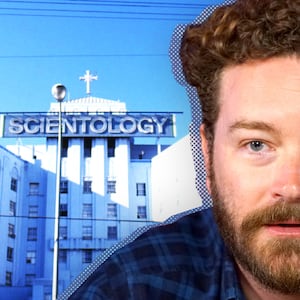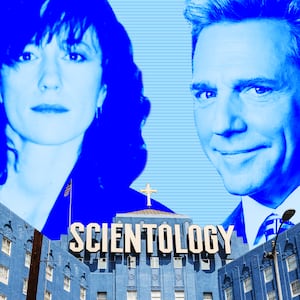For years, Leah Remini has listened to the horror stories of people who have escaped the clutches of Scientology, and she has had it.
“What I care about is justice for the victims of Scientology,” the actress and whistleblower tells me. “We need to start raiding Scientology’s folders, and we need to start taking action. Enough of the Twitter bullshit. Now it’s time to get serious.”
On Aug. 26, A&E will air the finale episode of the Emmy-winning series Leah Remini: Scientology and the Aftermath. It’s a 2-hour special focusing on the rape allegations against actor (and Scientologist) Danny Masterson, and features two of the That '70s Show star’s accusers telling all to ex-Scientologists Remini and Mike Rinder.
The episode was supposed to air in February but was put on hold by the network following an elaborate smear campaign conducted by the Church of Scientology. Recently, four of Masterson’s sexual-assault accusers have filed a civil suit against Masterson, the Church of Scientology, and its leader, David Miscavige, alleging “stalking, physical invasion of privacy and a conspiracy to obstruct justice,” according to reporter Yashar Ali. (Masterson has called the suit “beyond ridiculous.”)
“It’s important that people hear what goes on in Scientology when a crime is committed, and how the victims are blamed for what happens to them,” says Remini. “That’s Scientology technology, to say, ‘When have you raped somebody in a former life’ or ‘What have you done to receive that?’ It’s never, ‘Wow, you’ve been raped or molested, we need to contact the police.’ You’re not allowed to report crimes outside of Scientology. If you do, you are labeled an enemy, and they will come after you and try to destroy your life.” (The Church of Scientology issued a rambling statement to The Daily Beast branding Remini “dangerously unhinged,” as they have done in the past.)
In a wide-ranging conversation with The Daily Beast, Remini opened up about the end of Scientology and the Aftermath, her frustration over shelved episodes, and what’s next in her quest to expose an organization she calls “a dangerous cult that’s hurting people.”
I was pretty surprised when I heard the news that Scientology and the Aftermath was ending its run after three seasons—and the 2-hour special.
It wasn’t a surprise to me—I mean, it wasn’t cancelled. It was not that situation. I think we’ve done our work—what we’ve set out to achieve, we’ve achieved—and the things Mike [Rinder] and I need to do now just cannot be done in this way. I don’t want anyone to think the show is cancelled, because that’s not true. A&E were amazing partners, as were our partners at IPC and Disney, but we have some other work to do. That’s become clear.
What is that other work?
Well, I don’t want to tell you! But Mike and I have done a lot of work behind the scenes. We’ve needed to help victims coming to us to get real justice, so we’ve done that work, and I think you’re seeing that now—people are filing lawsuits, people are going to the police, people are filing police reports. We can only tell so many stories. I can’t sit there and bite my tongue and not be able to knock down a door or two; that’s just not my personality. And there are certain constraints with network television run by advertising dollars. We have great support from our audience, and I think they want Scientology to be stopped.
You mentioned “constraints with network television.” What were those, exactly? Because we reported that this finale episode featuring the Danny Masterson accusers was shelved by A&E for some time after a smear campaign conducted by the Church of Scientology.
It’s certainly heartbreaking when you have survivors coming forward who want to talk to you because they trust you, and for whatever reason… those reasons are not given to me, certainly people don’t need to answer to me—and also, two of the victims decided that this wasn’t the right time for them and requested that they not be shown. That’s just not the show that we do, but I totally respect and understand the decision to remain anonymous. There were also a few other shows that were shelved, and it was very painful for me and Mike to not have our audience see those episodes. But again, I’m not paying for the show and I’m not a lawyer. They vet these shows up and down, and for whatever reason—or reasons—certain shows had to be shelved. Yes, we have binders and binders of legal threats from Scientology and their lawyers, and there were 441 letters written from Scientology to our advertisers, and they’re picketing outside of A&E and crying “religious bigotry.” This is what they do with their time. Their usual bullshit.
What did those shelved episodes explore?
One episode was important because it was about the directives of Scientology’s “Fair Game” policies, which are probably 1,000+ policies on how to destroy people who speak out against Scientology, how to infiltrate government agencies, how to lie to the police—and how to lie to the authorities in general. They got away with it, and have been getting away with it. Another episode was, we had a family member who reached out to us who wanted to check in on her uncle, because she hadn’t seen him for 30 years and he was up at the Gold Base, where they are holding the senior executives of Scientology, and her doing a welfare check launched an attack from Scientology, because doing a welfare check on any member of Scientology is seen as an act of war—as I did with Shelly Miscavige. They sent PIs to this woman’s house—she was a grandmother—to scare her, and for some reason we couldn’t air this episode. They didn’t give me an answer, but to me, there’s no good answer. It’s very difficult for me to listen to these people’s stories who are trying to be active and go against what Scientology is telling them to do, and then have to say, “For some reason, we just couldn’t air the episode.”
We’ve done plenty of reporting on the Danny Masterson sexual-assault allegations. Why did you decide to have the final Aftermath episode focus on this, and what do you hope to shed light on with it?
I felt a responsibility to them. They came to speak to us, they asked for our help, and the show—for whatever reason—was delayed. Look, I can’t blame A&E, because without them we couldn’t have done the work that we’ve done, so I want to make that clear. But you’re hearing somebody after three years of hearing about children being molested, women being raped, and Scientology obstructing justice, so I am at my wit’s end with this organization continuing to get away with this shit, and I thought it was important, even though we have only two of the four accusers—two are remaining anonymous for now, and all four have filed a civil lawsuit, and they just want their day in court. If it was any other organization or any other person, Jackie Lacey [District Attorney of Los Angeles] would have filed charges and moved forward. They deserve for a jury to decide.
We’ve reported on this a bit as well but there’s this weird trend of people with strong ties to Scientology getting very close to members of the Trump administration.
Very close? Very close?! No, close! Close, babe. Close. Donald Trump has tweeted about [Scientologist singer] Joy Villa, a person who’s infiltrated the White House. Yes!
There’s also Greg Mitchell, a lobbyist who’s done a lot of work for the Church of Scientology, who met with Vice President Mike Pence. And there were two big Scientology donors in Jim Bridgeforth and Tom Cummins, of American Power & Gas, who recently met and posed for pictures with President Trump.
Yup. They should do some research. There’s a policy in Scientology dealing with the public image—this is also under the Fair Game stuff—and it’s to infiltrate real churches, control governments, control government agencies. This is all part of the policy of Scientology, which is to infiltrate to take over. They have no idea what they’re dealing with, and I’m disappointed that they’re not seeing through Joy Villa’s bullshit. I mean, you only need to look at her social media to see whose [political] side she was on before, she wears that Trump dress, and then she gets her failing career going. This is all part of the game of Scientology. Scientology hopes to take over our government.
You also have people out there like Greta Van Susteren. I don’t think a lot of people know that she’s a high-ranking Scientologist, and she’s out there conducting sit-down interviews with President Trump and other high-ranking officials in his administration.
Big-time! She’s a big-time donor to Scientology and she’s OT VIII. That’s the top of the Scientology bridge!
I know you alluded to working more behind the scenes exposing Scientology post-Aftermath, so is that what you’ll be doing now? Trying to facilitate more action—lawsuits, etc.—against the Church of Scientology?
Yes. We’re doing all that we can. Look, we did what we wanted to do which was alert the public to what was going on, and let them know that it’s not some cute, innocuous little cult—it’s a dangerous cult that’s hurting people. We wanted people to care, and to see these people as real people. Most people don’t get into Scientology because they want to hurt people; they get in because they think they’re helping the world. Once you’re indoctrinated into Scientology you believe it’s you against the world, and without you, the world has no hope. That justifies a lot of bad behavior. The public now knows that this is not something to laugh at. They want to “clear” the planet, which means make the majority of the world Scientologists, and that means taking over the government, infiltrating other religions, turning people from their families, and destroying people. We’ve done what we can do in this first phase, and now we’re on to phase II.



